强烈推荐,有经典例句的被动语态的用法
- 格式:doc
- 大小:35.00 KB
- 文档页数:3
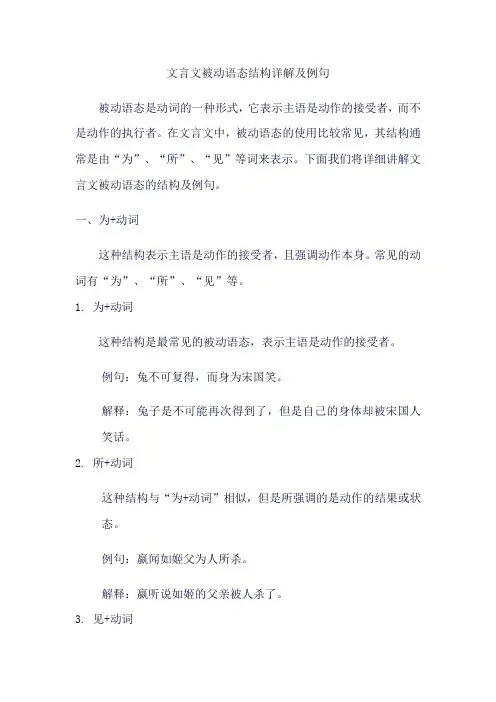
文言文被动语态结构详解及例句被动语态是动词的一种形式,它表示主语是动作的接受者,而不是动作的执行者。
在文言文中,被动语态的使用比较常见,其结构通常是由“为”、“所”、“见”等词来表示。
下面我们将详细讲解文言文被动语态的结构及例句。
一、为+动词这种结构表示主语是动作的接受者,且强调动作本身。
常见的动词有“为”、“所”、“见”等。
1.为+动词这种结构是最常见的被动语态,表示主语是动作的接受者。
例句:兔不可复得,而身为宋国笑。
解释:兔子是不可能再次得到了,但是自己的身体却被宋国人笑话。
2.所+动词这种结构与“为+动词”相似,但是所强调的是动作的结果或状态。
例句:嬴闻如姬父为人所杀。
解释:嬴听说如姬的父亲被人杀了。
3.见+动词这种结构表示主语被动作所影响或产生了某种结果。
例句:君之病见风雨寒露,不避烈日。
解释:您的病表现在风雨寒露之中,不避开烈日。
二、其它被动语态结构1.受+动词这种结构表示主语接受到了某种动作或影响。
例句:受命以来,夙夜忧叹。
解释:自从接受命令以来,我日夜忧虑叹息。
2. 蒙+动词这种结构表示主语受到了某种动作或影响的影响或蒙蔽。
除了上述常见的被动语态结构,还有一些不太常见的被动语态结构,如“于+动词”、“见+动词+于”等。
3.于+动词这种结构表示主语是动作的接受者,且强调动作发生在某种场所或情况下。
例句:晋侯秦伯围郑,以其无礼于晋。
解释:晋侯和秦伯围攻郑国,因为郑国对晋国没有礼貌。
4. 见+动词+于这种结构表示主语被某种动作所影响或产生了某种结果,且强调动作发生在某种场所或情况下。
例句:吾长见笑于大方之家。
解释:我常常被有见识的人所嘲笑。
总之,文言文被动语态的结构比较复杂,但只要掌握了常见的结构及用法,就能够正确理解文言文中的被动语态。
同时,要注意被动语态与主动语态的区别,以免产生误解。
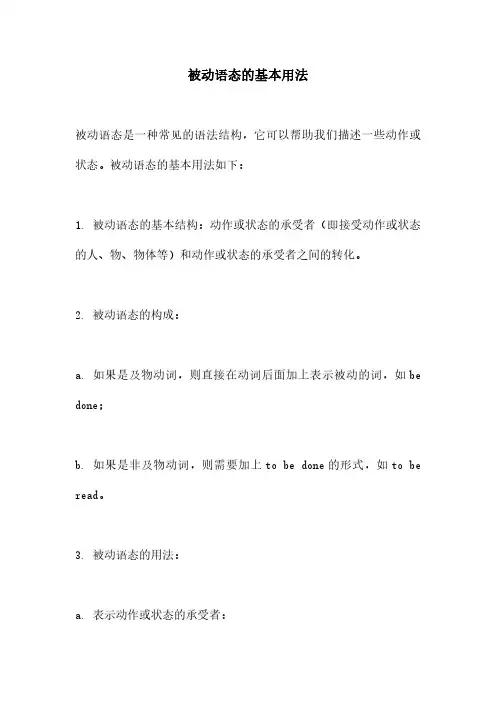
被动语态的基本用法
被动语态是一种常见的语法结构,它可以帮助我们描述一些动作或状态。
被动语态的基本用法如下:
1.被动语态的基本结构:动作或状态的承受者(即接受动作或状态的人、物、物体等)和动作或状态的承受者之间的转化。
2.被动语态的构成:
a.如果是及物动词,则直接在动词后面加上表示被动的词,如be done;
b.如果是非及物动词,则需要加上to be done的形式,如to be read。
3.被动语态的用法:
a.表示动作或状态的承受者:
例如:The window was broke by the ball.(窗户被球砸破了。
)在这个例子中,window是动作承受者,而ball是动作施加者。
b.表示动作或状态的承受者之间的转化:
例如:The teacher gave the students lessons to be studied.(老师把课程给了学生们去学习。
)在这个例子中,students是动作承受者,而lessons是动作施加者。
学生们需要通过学习来转化他们所承受的lessons。
4.被动语态的注意事项:
a.动词的时态和语态:
例如:The cake was baked by my sister.(我姐姐做了一个蛋糕。
)在这个例子中,动词是过去时态,而语态是被动语态。
b.避免滥用:
虽然被动语态可以表示一些动作或状态的接受者,但我们也要注意不要滥用它。
总之,被动语态是一种常见的语法结构,可以帮助我们清晰地表达一些动作或状态的接受者。
我们需要注意其用法和语态,以避免滥用。
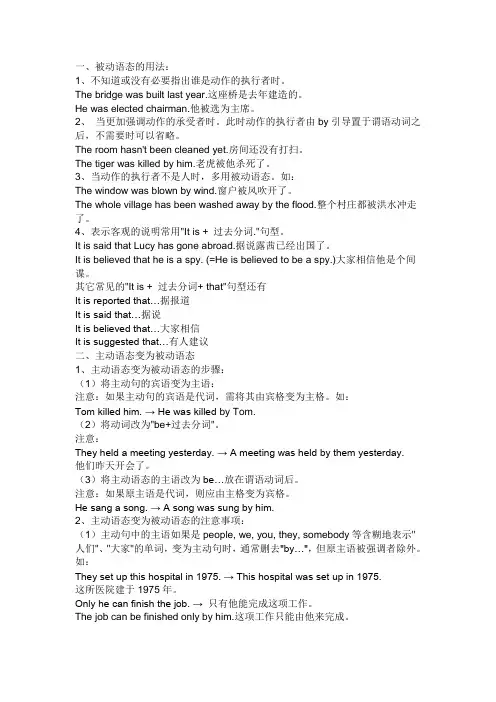
一、被动语态的用法:1、不知道或没有必要指出谁是动作的执行者时。
The bridge was built last year.这座桥是去年建造的。
He was elected chairman.他被选为主席。
2、当更加强调动作的承受者时。
此时动作的执行者由by引导置于谓语动词之后,不需要时可以省略。
The room hasn't been cleaned yet.房间还没有打扫。
The tiger was killed by him.老虎被他杀死了。
3、当动作的执行者不是人时,多用被动语态。
如:The window was blown by wind.窗户被风吹开了。
The whole village has been washed away by the flood.整个村庄都被洪水冲走了。
4、表示客观的说明常用"It is + 过去分词."句型。
It is said that Lucy has gone abroad.据说露茜已经出国了。
It is believed that he is a spy. (=He is believed to be a spy.)大家相信他是个间谍。
其它常见的"It is + 过去分词+ that"句型还有It is reported that…据报道It is said that…据说It is believed that…大家相信It is suggested that…有人建议二、主动语态变为被动语态1、主动语态变为被动语态的步骤:(1)将主动句的宾语变为主语:注意:如果主动句的宾语是代词,需将其由宾格变为主格。
如:Tom killed him. → He was killed by Tom.(2)将动词改为"be+过去分词"。
注意:They held a meeting yesterday. → A meeting was held by them yesterday.他们昨天开会了。
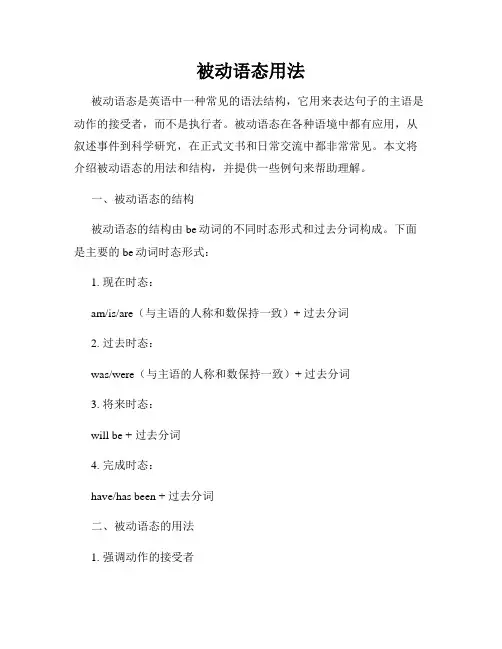
被动语态用法被动语态是英语中一种常见的语法结构,它用来表达句子的主语是动作的接受者,而不是执行者。
被动语态在各种语境中都有应用,从叙述事件到科学研究,在正式文书和日常交流中都非常常见。
本文将介绍被动语态的用法和结构,并提供一些例句来帮助理解。
一、被动语态的结构被动语态的结构由be动词的不同时态形式和过去分词构成。
下面是主要的be动词时态形式:1. 现在时态:am/is/are(与主语的人称和数保持一致)+ 过去分词2. 过去时态:was/were(与主语的人称和数保持一致)+ 过去分词3. 将来时态:will be + 过去分词4. 完成时态:have/has been + 过去分词二、被动语态的用法1. 强调动作的接受者被动语态常用来强调动作的接受者,而不是执行者。
这种用法常见于报道新闻、描述事件或者提及一般事实。
例句:- The new shopping mall was opened last week.(新的购物中心上周开业了。
)- The cake was made by my mother.(这个蛋糕是我妈妈做的。
)- The message has been received.(信息已经收到。
)2. 隐藏或省略动作的执行者有时候,在句子中故意省略动作的执行者。
这种用法常见于强调动作本身,而无须关注执行动作的人或事物。
例句:- The window was broken.(窗户被打破了。
)- The car was stolen last night.(车昨晚被偷了。
)- The book has been misplaced.(这本书被错放了。
)3. 无需或不必指明动作的执行者有时候,在句子中并无需或不必指明动作的执行者。
这种用法常见于科学研究、书面报告或一般陈述中。
例句:- It is believed that the Earth is round.(普遍认为地球是圆的。
)- Wine is made from grapes.(葡萄酒是由葡萄制成的。
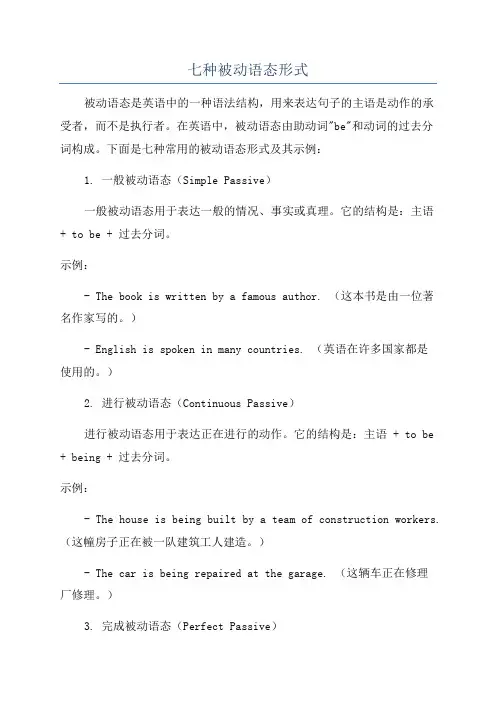
七种被动语态形式被动语态是英语中的一种语法结构,用来表达句子的主语是动作的承受者,而不是执行者。
在英语中,被动语态由助动词"be"和动词的过去分词构成。
下面是七种常用的被动语态形式及其示例:1. 一般被动语态(Simple Passive)一般被动语态用于表达一般的情况、事实或真理。
它的结构是:主语+ to be + 过去分词。
示例:- The book is written by a famous author. (这本书是由一位著名作家写的。
)- English is spoken in many countries. (英语在许多国家都是使用的。
)2. 进行被动语态(Continuous Passive)进行被动语态用于表达正在进行的动作。
它的结构是:主语 + to be + being + 过去分词。
示例:- The house is being built by a team of construction workers. (这幢房子正在被一队建筑工人建造。
)- The car is being repaired at the garage. (这辆车正在修理厂修理。
)3. 完成被动语态(Perfect Passive)完成被动语态用于表达已经完成的动作。
它的结构是:主语 + to have been + 过去分词。
示例:- The cake has been eaten by all the guests. (这个蛋糕已经被所有的客人吃掉了。
)4. 一般完成被动语态(Simple Perfect Passive)一般完成被动语态用于表达已经完成的一般情况、事实或真理。
它的结构是:主语 + to have been + 过去分词。
示例:- The job offer has been rejected by many applicants. (这个工作邀请已经被许多申请人拒绝了。
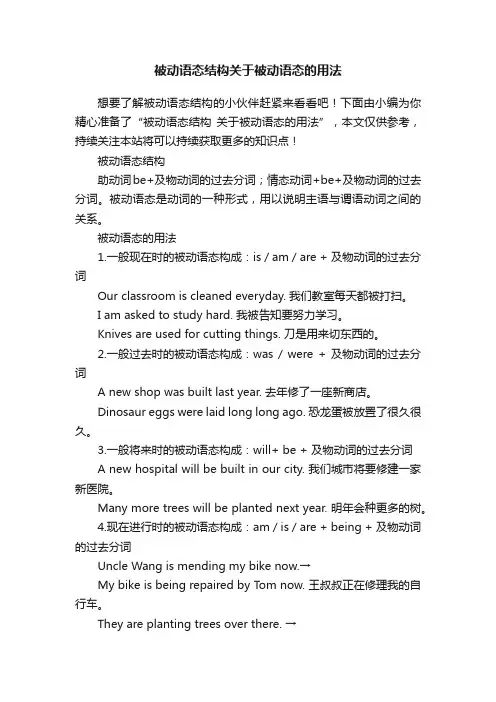
被动语态结构关于被动语态的用法想要了解被动语态结构的小伙伴赶紧来看看吧!下面由小编为你精心准备了“被动语态结构关于被动语态的用法”,本文仅供参考,持续关注本站将可以持续获取更多的知识点!被动语态结构助动词be+及物动词的过去分词;情态动词+be+及物动词的过去分词。
被动语态是动词的一种形式,用以说明主语与谓语动词之间的关系。
被动语态的用法1.一般现在时的被动语态构成:is / am / are + 及物动词的过去分词Our classroom is cleaned everyday. 我们教室每天都被打扫。
I am asked to study hard. 我被告知要努力学习。
Knives are used for cutting things. 刀是用来切东西的。
2.一般过去时的被动语态构成:was / were + 及物动词的过去分词A new shop was built last year. 去年修了一座新商店。
Dinosaur eggs were laid long long ago. 恐龙蛋被放置了很久很久。
3.一般将来时的被动语态构成:will+ be + 及物动词的过去分词A new hospital will be built in our city. 我们城市将要修建一家新医院。
Many more trees will be planted next year. 明年会种更多的树。
4.现在进行时的被动语态构成:am / is / are + being + 及物动词的过去分词Uncle Wang is m ending my bike now.→My bike is being repaired by Tom now. 王叔叔正在修理我的自行车。
They are planting trees over there. →Trees are being planted over there by them. 他们在那里种植的树木。
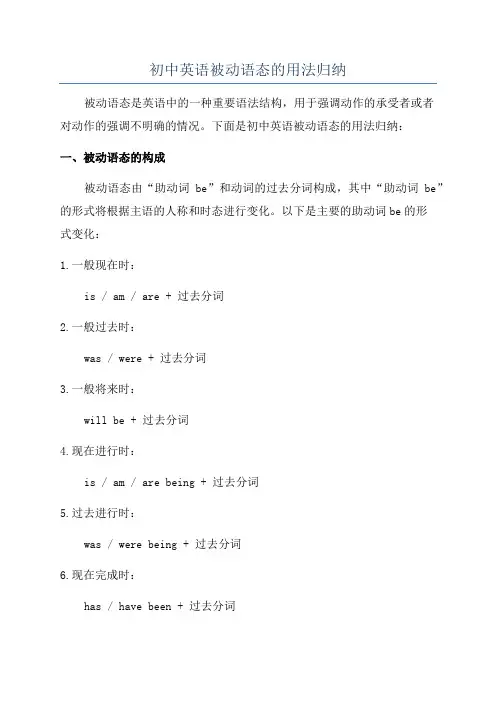
初中英语被动语态的用法归纳被动语态是英语中的一种重要语法结构,用于强调动作的承受者或者对动作的强调不明确的情况。
下面是初中英语被动语态的用法归纳:一、被动语态的构成被动语态由“助动词be”和动词的过去分词构成,其中“助动词be”的形式将根据主语的人称和时态进行变化。
以下是主要的助动词be的形式变化:1.一般现在时:is / am / are + 过去分词2.一般过去时:was / were + 过去分词3.一般将来时:will be + 过去分词4.现在进行时:is / am / are being + 过去分词5.过去进行时:was / were being + 过去分词6.现在完成时:has / have been + 过去分词7.过去完成时:had been + 过去分词二、被动语态的用法1.表示动作的发出者不明确或不重要的情况:The book is written in English.(这本书是用英语写的。
)2.当我们不知道主语是谁时:The letter was found on the desk.(这封信是在桌子上找到的。
)3.当主语是人时,通常不使用被动语态:She is preparing for the test.(她正在为考试做准备。
)4. 当动作的承受者是很明显的时候,可以用by短语表示:The cake was made by my mother.(这个蛋糕是我妈妈做的。
)三、被动语态的使用技巧1.如果主动语态中的宾语是不定式,将不定式变为过去分词后构成被动语态:I want to buy a new car.(我想买一辆新车。
)A new car is wanted to be bought by me.(一辆新车是我想买的。
)2. 如果主动语态中的宾语是that从句,则不定式变为不定式的被动式:They believe that he will finish the work in a week.(他们相信他会在一个星期内完成这项工作。
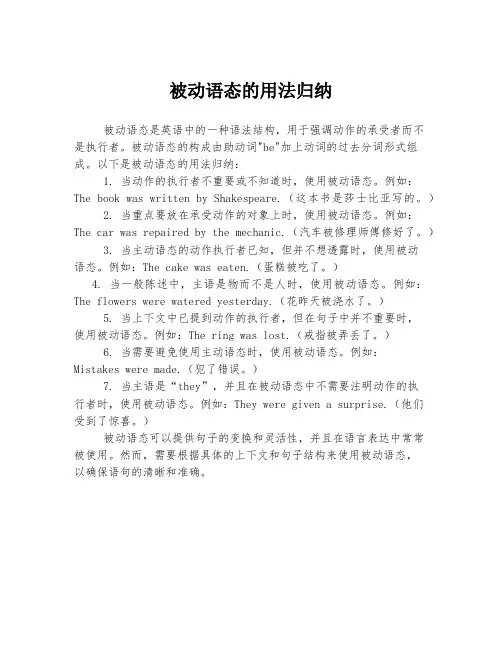
被动语态的用法归纳被动语态是英语中的一种语法结构,用于强调动作的承受者而不是执行者。
被动语态的构成由助动词"be"加上动词的过去分词形式组成。
以下是被动语态的用法归纳:1. 当动作的执行者不重要或不知道时,使用被动语态。
例如:The book was written by Shakespeare.(这本书是莎士比亚写的。
)2. 当重点要放在承受动作的对象上时,使用被动语态。
例如:The car was repaired by the mechanic.(汽车被修理师傅修好了。
)3. 当主动语态的动作执行者已知,但并不想透露时,使用被动语态。
例如:The cake was eaten.(蛋糕被吃了。
)4. 当一般陈述中,主语是物而不是人时,使用被动语态。
例如:The flowers were watered yesterday.(花昨天被浇水了。
)5. 当上下文中已提到动作的执行者,但在句子中并不重要时,使用被动语态。
例如:The ring was lost.(戒指被弄丢了。
)6. 当需要避免使用主动语态时,使用被动语态。
例如:Mistakes were made.(犯了错误。
)7. 当主语是“they”,并且在被动语态中不需要注明动作的执行者时,使用被动语态。
例如:They were given a surprise.(他们受到了惊喜。
)被动语态可以提供句子的变换和灵活性,并且在语言表达中常常被使用。
然而,需要根据具体的上下文和句子结构来使用被动语态,以确保语句的清晰和准确。
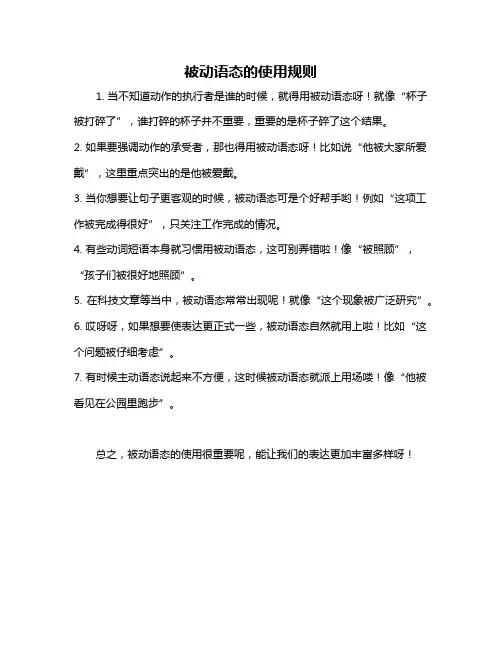
被动语态的使用规则
1. 当不知道动作的执行者是谁的时候,就得用被动语态呀!就像“杯子被打碎了”,谁打碎的杯子并不重要,重要的是杯子碎了这个结果。
2. 如果要强调动作的承受者,那也得用被动语态呀!比如说“他被大家所爱戴”,这里重点突出的是他被爱戴。
3. 当你想要让句子更客观的时候,被动语态可是个好帮手哟!例如“这项工作被完成得很好”,只关注工作完成的情况。
4. 有些动词短语本身就习惯用被动语态,这可别弄错啦!像“被照顾”,“孩子们被很好地照顾”。
5. 在科技文章等当中,被动语态常常出现呢!就像“这个现象被广泛研究”。
6. 哎呀呀,如果想要使表达更正式一些,被动语态自然就用上啦!比如“这个问题被仔细考虑”。
7. 有时候主动语态说起来不方便,这时候被动语态就派上用场喽!像“他被看见在公园里跑步”。
总之,被动语态的使用很重要呢,能让我们的表达更加丰富多样呀!。
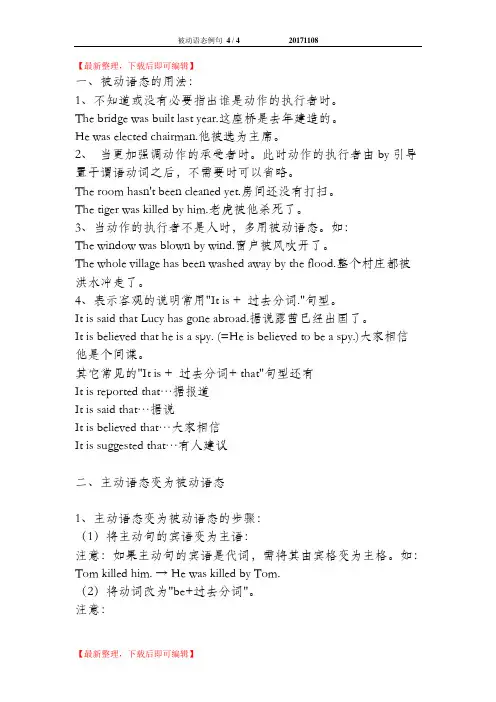
【最新整理,下载后即可编辑】一、被动语态的用法:1、不知道或没有必要指出谁是动作的执行者时。
The bridge was built last year.这座桥是去年建造的。
He was elected chairman.他被选为主席。
2、当更加强调动作的承受者时。
此时动作的执行者由by引导置于谓语动词之后,不需要时可以省略。
The room hasn't been cleaned yet.房间还没有打扫。
The tiger was killed by him.老虎被他杀死了。
3、当动作的执行者不是人时,多用被动语态。
如:The window was blown by wind.窗户被风吹开了。
The whole village has been washed away by the flood.整个村庄都被洪水冲走了。
4、表示客观的说明常用"It is + 过去分词."句型。
It is said that Lucy has gone abroad.据说露茜已经出国了。
It is believed that he is a spy. (=He is believed to be a spy.)大家相信他是个间谍。
其它常见的"It is + 过去分词+ that"句型还有It is reported that…据报道It is said that…据说It is believed that…大家相信It is suggested that…有人建议二、主动语态变为被动语态1、主动语态变为被动语态的步骤:(1)将主动句的宾语变为主语:注意:如果主动句的宾语是代词,需将其由宾格变为主格。
如:Tom killed him. → He was killed by Tom.(2)将动词改为"be+过去分词"。
注意:They held a meeting yesterday. → A meeting was held by them yesterday.他们昨天开会了。
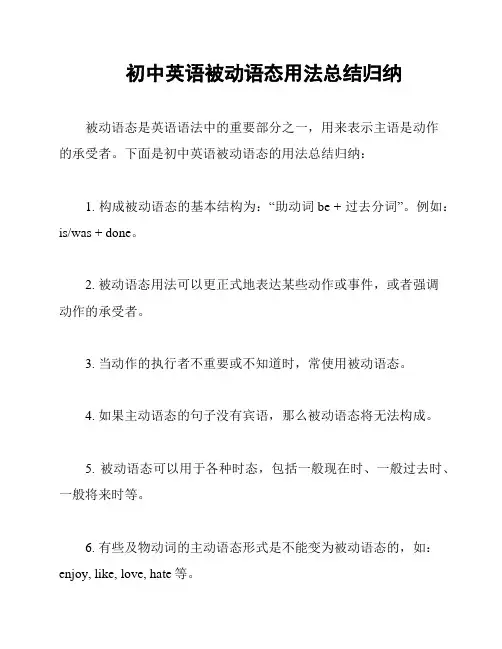
初中英语被动语态用法总结归纳
被动语态是英语语法中的重要部分之一,用来表示主语是动作
的承受者。
下面是初中英语被动语态的用法总结归纳:
1. 构成被动语态的基本结构为:“助动词be + 过去分词”。
例如:is/was + done。
2. 被动语态用法可以更正式地表达某些动作或事件,或者强调
动作的承受者。
3. 当动作的执行者不重要或不知道时,常使用被动语态。
4. 如果主动语态的句子没有宾语,那么被动语态将无法构成。
5. 被动语态可以用于各种时态,包括一般现在时、一般过去时、一般将来时等。
6. 有些及物动词的主动语态形式是不能变为被动语态的,如:enjoy, like, love, hate等。
7. 当被动语态中有双宾语时,可以使用两种形式的被动结构:间接宾语+直接宾语+过去分词,或者直接宾语+间接宾语+过去分词。
8. 在被动语态中,介词短语常常位于过去分词之前。
9. 动词不定式的被动式结构为:“to be + 过去分词”。
以上是初中英语被动语态的用法总结。
掌握被动语态的用法,有助于扩展语言表达能力,使句子更加生动和多样化。
被动语态的用法及例句一、引言被动语态是英语中非常重要且常用的一种语法结构。
掌握被动语态的用法和书写方式,对提高我们的英语写作能力至关重要。
本文将详细介绍被动语态的定义、形式和基本结构,并提供一些具体的例句来帮助读者更好地理解和运用被动语态。
二、被动语态的定义在英语中,当主语是执行某个动作的对象而不是执行者时,我们就可以使用被动语态。
通过使用被动语态,我们可以聚焦于行为或事件所产生的影响,而不需要强调执行动作的人或物。
三、被动语态的形式要构造一个被动句子,我们需要使用助动词"be"加上过去分词形式(通常以-ed 或-en结尾)。
具体而言,根据时态和情景,"be" 的形式可以是"is"、"am"、"are"(现在时)、"was"、"were"(过去时)等。
四、基本结构1. 现在时:[be (is/am/are)] + [过去分词]2. 过去时:[be (was/were)] + [过去分词]3. 将来时:[will be] + [过去分词]4. 现在完成时:[have/has been] + [过去分词]五、例句下面是一些例句,展示了被动语态在不同情景下的正确应用。
1. 现在时:- 主动语态: He writes letters.- 被动语态: Letters are written by him.2. 过去时:- 主动语态: She repaired the car.- 被动语态: The car was repaired by her.3. 将来时:- 主动语态: They will finish the project next week.- 被动语态: The project will be finished by them next week.4. 现在完成时:- 主动语态: We have completed the task.- 被动语态: The task has been completed by us.六、被动语态的用途1. 强调行为承受者而非执行者:被动语态可以将行为的接收者置于主要焦点。
被动语态的用法1.一般现在时的被动语态构成为:is / am / are + 及物动词的过去分词。
例如:我们的教室每天都被打扫。
我被要求努力研究。
刀子用于切割物品。
2.一般过去时的被动语态构成为:was / were + 及物动词的过去分词。
例如:去年建了一家新商店。
恐龙蛋很久以前就被放置了。
3.现在完成时的被动语态构成为:has / have + been + 及物动词的过去分词。
例如:这本书已经被翻译成了很多种语言。
很多国家已经发射了许多人造卫星。
4.一般将来时的被动语态构成为:will + be + 及物动词的过去分词。
例如:我们城市将会建造一家新医院。
明年将会种更多的树。
5.含有情态动词的被动语态构成为:情态动词 + be + 及物动词的过去分词。
例如:年轻的树必须经常浇水。
你的错误应该立即纠正。
门可能被从里面锁上了。
你的作业可以明天交。
6.现在进行时的被动语态构成为:am / is / are + being + 及物动词的过去分词。
例如:___正在修理我的自行车。
现在我的自行车正在被___修理。
他们正在那里种树。
现在树正在被他们种植。
1.不及物动词没有被动语态。
What will happen in 100 years。
Dinosaurs disappeared about 65 n years ago.2.有些动词用主动形式表示被动意义。
___.3.感官动词或使役动词使用省略to的动词不定式。
在主动语态中不带to,但变为被动语态时,须加上to。
例如:make somebody do something → somebody + be + made to do something。
see somebody do somethi ng → somebody + be + seen to do something。
A girl saw my wallet drop when she passed by。
被动语态的用法总结归纳被动语态是英语中常用的一种句式,它强调动作的接受者而非执行者。
在许多情况下,使用被动语态可以使文章更加客观、生动,并减少重复使用主动语态。
本文将总结和归纳被动语态的使用方法及其注意事项。
一、被动语态的构成被动语态由be 动词(am, is, are, was, were)和过去分词组成。
其中,be 动词根据主语的数与时态变化,而过去分词则保持不变。
1. 时态变化:- 现在时:am/is/are + 过去分词- 过去时:was/were + 过去分词- 将来时:will be + 过去分词2. 主语变为宾语:主动语态中的主语变为被动句中的宾语,即由接受者(receiver)取代执行者(doer)。
这样可以突出接受者并使句子更加直接。
举例说明:主动语态:The cat chased the mouse.被动语态:The mouse was chased by the cat.二、被动语态的用途及意义1. 重点强调接受者:被动语态用于强调动作的接受者,而非执行者。
这样可以使句子中的重点内容突出,并增加表达的准确性。
举例说明:主动语态:Tom planted the trees in the park.被动语态:The trees were planted in the park by Tom.2. 避免指责:在某些情况下,使用被动语态可以避免直接指责或暗示特定执行者。
这样可以使句子更加客观和中立。
举例说明:主动语态:Someone broke the window last night.被动语态:The window was broken last night.3. 对不知道执行者的情况描述:当我们不知道或不关心执行者是谁时,可以使用被动语态来描述一些事件或行为。
举例说明:主动语态:They have found a lost wallet.被动语态:A lost wallet has been found.三、注意事项1. 动词形式的变化:在构成被动句时,be 动词根据主语的数与时态进行变化,而过去分词保持不变。
被动语态的具体用法总结1. 什么是被动语态被动语态是英语中的一种时态,用于表达主语是动作的接受者或受事者。
在被动语态中,谓语动词由”be”(根据时态的不同,可以是am, is, are, was, were, has been, have been, had been等)和过去分词构成。
2. 被动语态的基本结构被动语态的基本结构为:be + 过去分词。
例如: - Active: They repair the car. - Passive: The car is repaired by them.3. 被动语态的时态和人称变化被动语态可以根据时态和人称进行变化,即通过改变be动词的形式来表达不同的时态和人称。
3.1 一般现在时的被动语态•肯定句:am/is/are + 过去分词•否定句:am/is/are + not + 过去分词•疑问句:Am/Is/Are + 主语 + 过去分词?例如: - Active: They repair the car. - Passive: - 肯定句:The car is repaired by them. - 否定句:The car is not repaired by them. - 疑问句:Is the car repaired by them?3.2 一般过去时的被动语态•肯定句:was/were + 过去分词•否定句:was/were + not + 过去分词•疑问句:Was/Were + 主语 + 过去分词?例如: - Active: They repaired the car. - Passive: - 肯定句:The car was repaired by them. - 否定句:The car was not repaired by them. - 疑问句:Was the car repaired by them?3.3 现在进行时的被动语态•肯定句:am/is/are being + 过去分词•否定句:am/is/are not being + 过去分词•疑问句:Am/Is/Are + 主语 + being + 过去分词?例如: - Active: They are repairing the car. - Passive: - 肯定句:Thecar is being repaired by them. - 否定句:The car is not being repairedby them. - 疑问句:Is the car being repaired by them?3.4 过去进行时的被动语态•肯定句:was/were being + 过去分词•否定句:was/were not being + 过去分词•疑问句:Was/Were + 主语 + being + 过去分词?例如: - Active: They were repairing the car. - Passive: - 肯定句:The car was being repaired by them. - 否定句:The car was not being repaired by them. - 疑问句:Was the car being repaired by them?3.5 将来时的被动语态•肯定句:will be + 过去分词•否定句:will not be + 过去分词•疑问句:Will + 主语 + be + 过去分词?例如: - Active: They will repair the car. - Passive: - 肯定句:The car will be repaired by them. - 否定句:The car will not be repaired by them. - 疑问句:Will the car be repaired by them?4. 被动语态的用法4.1 强调动作的接受者被动语态常用于强调动作的接受者,将注意力放在接受者身上,而不是执行者。
被动语态的用法讲解一、什么是被动语态被动语态是英语中一种常用的句式结构,它强调主语受到动作的影响或承受了某种行为。
在被动语态中,主动词的对象变成了句子的主语,而原来的主语则变成了介词by短语中使用。
被动语态特别适用于当我们不知道或者不关心谁执行了动作时。
二、构造被动语态被动语态由“be”(根据时态和人称变化)+过去分词构成。
下面是各种时态下的例子:1. 一般现在时:am/is/are + 过去分词主动:She eats an apple.被动:An apple is eaten by her.2. 一般过去时:was/were + 过去分词主动:They opened the door.被动:The door was opened by them.3. 一般将来时:will be + 过去分词主动:He will write a book.被动:A book will be written by him.4. 现在完成时:has/have been + 过去分词主动:We have finished the project.被动:The project has been finished by us.5. 现在进行时:am/is/are being + 过去分词主动:She is reading a book.被动:A book is being read by her.6. 过去进行时:was/were being + 过去分词主动:They were painting the house.被动:The house was being painted by them.三、被动语态的用法1. 强调行为受害者被动语态用于突出行为或事件的受害者,使其成为句子的重点。
例如:主动:The dog bit John.被动:John was bitten by the dog.在这个例子中,主语从"dog"变成了"John",强调了John受到了咬伤。
一、被动语态的用法:1、不知道或没有必要指出谁是动作的执行者时。
The bridge was built last year.这座桥是去年建造的。
He was elected chairman.他被选为主席。
2、当更加强调动作的承受者时。
此时动作的执行者由by引导置于谓语动词之后,不需要时可以省略。
The room hasn't been cleaned yet.房间还没有打扫。
The tiger was killed by him.老虎被他杀死了。
3、当动作的执行者不是人时,多用被动语态。
如:The window was blown by wind.窗户被风吹开了。
The whole village has been washed away by the flood.整个村庄都被洪水冲走了。
4、表示客观的说明常用"It is + 过去分词."句型。
It is said that Lucy has gone abroad.据说露茜已经出国了。
It is believed that he is a spy. (=He is believed to be a spy.)大家相信他是个间谍。
其它常见的"It is + 过去分词+ that"句型还有据报道It is reported that…据说It is said that…大家相信It is believed that…有人建议It is suggested that…二、主动语态变为被动语态1、主动语态变为被动语态的步骤:(1)将主动句的宾语变为主语:注意:如果主动句的宾语是代词,需将其由宾格变为主格。
如:by Tom.Tom killed him. → He was killed(2)将动词改为"be+过去分词"。
注意:They held a meeting yesterday. → A meeting was held by them yesterday. 他们昨天开会了。
一、被动语态的用法:
1、不知道或没有必要指出谁是动作的执行者时。
The bridge was built last year.这座桥是去年建造的。
He was elected chairman.他被选为主席。
2、当更加强调动作的承受者时。
此时动作的执行者由by引导置于谓语动词之后,不需要时可以省略。
The room hasn't been cleaned yet.房间还没有打扫。
The tiger was killed by him.老虎被他杀死了。
3、当动作的执行者不是人时,多用被动语态。
如:
The window was blown by wind.窗户被风吹开了。
The whole village has been washed away by the flood.整个村庄都被洪水冲走了。
4、表示客观的说明常用"It is + 过去分词."句型。
It is said that Lucy has gone abroad.据说露茜已经出国了。
It is believed that he is a spy. (=He is believed to be a spy.)大家相信他是个间谍。
其它常见的"It is + 过去分词+ that"句型还有
It is reported that…据报道
It is said that…据说
It is believed that…大家相信
It is suggested that…有人建议
二、主动语态变为被动语态
1、主动语态变为被动语态的步骤:
(1)将主动句的宾语变为主语:
注意:如果主动句的宾语是代词,需将其由宾格变为主格。
如:
Tom killed him. → He was killed by Tom.
(2)将动词改为"be+过去分词"。
注意:
They held a meeting yesterday. → A meeting was held by them yesterday.
他们昨天开会了。
(3)将主动语态的主语改为be…放在谓语动词后。
注意:如果原主语是代词,则应由主格变为宾格。
He sang a song. → A song was sung by him.
2、主动语态变为被动语态的注意事项:
(1)主动句中的主语如果是people, we, you, they, somebody等含糊地表示"人们"、"大家"的单词,变为主动句时,通常删去"by…",但原主语被强调者除外。
如:
They set up this hospital in 1975. → This hospital was set up in 1975.
这所医院建于1975年。
Only he can finish the job. → 只有他能完成这项工作。
The job can be finished only by him.这项工作只能由他来完成。
(2)含有双宾语,即直接宾语和间接宾语的句子,每个宾语都可变为被动语态的主语,即其被动语态有两种形式。
但多以间接宾语作主语。
Jack told us the truth.杰克告诉了我们真相。
We were told the truth by Jack.
The truth was told (to) us by Jack.
三、动词的主动形式表示被动之意
以主动形式表示被动之意的动词多为连系动词,如:look, feel, smell等。
下列动词没有被动式:happen,cost,take,have
An accident was happened yesterday.(×)昨天发生了一起事故。
An accident happened yesterday.()
The flower smells sweet.这花闻起来很香。
The watch looks good.这表看起来很好。
This book sells well.这本书畅销。
四、各种时态的被动语态举例(以动词do为例)
1.一般现在时(am/ is/ are +done)
English is spoken by lots of people in the world. 世界上的许多人都说英语。
Class meeting is held every Thursday. 每周四都举行班会。
The classroom is cleaned by the students every day. 学生们每天都打扫教室。
2.一般过去时(was/ were +done)
The cup was broken by the boy. 杯子被那个男孩打碎了。
He was saved at last. 他最终获救了。
My bike was stolen. 我的自行车被偷了。
3.一般将来时与过去将来时(will/ shall be +done; would/should be +done)
A speech will be given this afternoon. 今天下午有一个演讲。
A new road will be built next year. 明年要修一条新马路。
I thought thousands of people would be helped. 我认为将有数千人得到帮助。
4.现在进行时与过去进行时(am/ is/ are being +done; was/ were being +done) The machine was being repaired at this time yesterday. 昨天这时,机器正在被修理。
The problem is being discussed now. 问题正在被讨论。
A bus is being pushed by the passengers. 路人正在推一辆公共汽车。
5.现在完成时(have/ has been + done)
Two hundred trees have been planted by now. 到现在为止,已经种了二百棵树了。
The book has been read many times by me. 这本书已经被我读了许多遍了。
Several soldiers have already been killed in the conflict. 在冲突中已经有几名士兵被杀害。
6.过去完成时(had been+done)
They said they had been invited to the party. 他们说已经被邀请参加晚会了。
She found the house had been destroyed by the storm. 她发现房子已经被暴风雨摧毁。
He had been tortured by the illness for many years before he died.
他在去世前已经被疾病折磨很多年了。